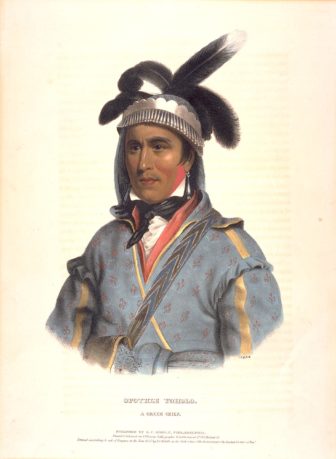Opothleyaholo
Creek Chief
 Born probably in Tuckabatchee, year of birth unknown, died in Kansas about 1866, was the son of Davy Cornells, who was the son of Joseph Cornells by a Tuckabatchee woman.
Born probably in Tuckabatchee, year of birth unknown, died in Kansas about 1866, was the son of Davy Cornells, who was the son of Joseph Cornells by a Tuckabatchee woman.
On good Creek authority the etymology of the name is “hupuena,” child, “hehle,” good, and “Yaholo,” holloer, whooper. Davy Cornells, the father, was killed by a party of lawless whites in June, 1793, while going under a white flag to see James Seagrove, the Creek agent, at Coleraine.
No facts have been preserved of the early life of Opothleyaholo, except that he was considered a promising youth, nor is it known when he rose to the position of speaker of the councils of the Upper Creek towns. His residence was in Tuckabachee, near the great council house. His first public service was in February, 1825, at the treaty of Indian Springs, whither he went as the representative of the Upper Creeks to remonstrate with General McIntosh against the cession of any part of the Creek country. In his speech before the commissioners, he told them that the chiefs present had no authority to cede lands, which could only be done in full council and with the consent of the whole Nation, and this was not a full council. While perfectly respectful to the commissioners, in his speech he warned General McIntosh of the doom that awaited him if he signed the treaty. Opolthleyaholo left the treaty ground for home the next day. McIntosh signed the treaty and paid for this action with his life. Opothleyaholo was at the head of the Creek chiefs that soon after went to Washington to protest against the validity of this treaty, and to execute one that would be more acceptable to his people. In all the negotiations that followed, “he conducted himself with great dignity and firmness, and displayed talents of a superior order. He was cool, cautious, and sagacious; and with a tact which would have done credit to a more refined diplomatist, refused to enter into any negotiation until the offensive treaty of the Indian Springs should be annulled. The executive being satisfied that the treaty had not been made with the consent of the nation, nor in accordance with its laws, but in opposition to the one, and in defiance of the other, disapproved of it, and another was made at Washington in January, 1826, the first article of which declared the treaty of the Indian Springs to be null and void.
Under the new treaty the Creeks ceded all their lands in Georgia except a small strip on the Chattahoochee, which after much negotiation was ceded to Georgia in 1827. On the death of Little Prince in Opothleyaholo became practically the principal chief of the Creeks, though he still continued to exercise the functions of speaker of the councils. In the Creek troubles of 1836, Sangahatchee, an Upper town, was the first to rise in revolt, and its painted warriors began to waylay and murder travelers on the highways. Without delay Opothleyaholo arrayed the warriors of Tuckabatchee, marched against the insurgent town, captured it, and delivered the prisoners captured into the hands of the military authorities. He next, at the request of Governor Clay, called a council of his warriors at Kialgee, and there, taking fifteen hundred of them, he marched to Talladega and offered their services to General Jessup, there in command of the regular troops. The offer was accepted, and Opothleyaholo, promoted to the rank of colonel, was appointed commander of all the Indian troops. The united regular and Indian forces, all under the command of General Jessup, now marched without delay to the town of Hatcheechubbee, where were embodied the hostiles, who, overawed by such an imposing force, surrendered, and the trouble was over.
Shortly after this came the enforced migration of the Creeks from their native land. Opothleyaholo had ever been extremely averse to emigration west. One of his objections was that the Upper and Lower Creeks could not live harmoniously in close contiguity with each other in the new country, cherishing, as they did, the bitter feelings engendered by the death of General McIntosh. His forebodings were not realized, for after settling in the new country, the old feud was in a measure forgotten, and Opothleyaholo still continued in his office as chief speaker in the Creek councils. At the outbreak of the great war of 1861, tile Creeks divided, the more ignorant position, influenced by Opothleyaholo, adhered to the Federal cause, while the educated and progressive element, under the Mclntoshes, were strong adherents of the Confederacy. A civil war ensued, with the result that Opothleyaholo with his partisans, in great destitution, retreated in December to Coffey County, Kansas, where the old chief died shortly after the war.
But little is known of the domestic life of Opothleyaholo, whether he had one or more wives. He had a son, born about 1816, who was educated at the Choctaw Academy in Kentucky, and named Colonel Johnson, in honor of Colonel Richard M. Johnson. He had several daughters, said to have been handsome women.
References. —McKenney and Hall’s Indian Tribes of North America (1854), vol. ii, pp. 7-15; Pickett’s History of Alabama (Owen’s Edi¬ tion), (1900), pp. 84, 652; Brewer’s Alabama (1872), p. 18; Transactions of the Alabama Historical Society (1899), vol. 3, pp. 163-165; Transactions of the Alabama Historical So¬ ciety (1904), vol. iv, p. 114; Handbook of American Indians (1910), part 2, pp. 141, 142; Official War Records, Serial Nos. 8, 19, 111, 117, 128; Sparks’ “ The Memories of Fifty Years (1872), pp. 467-478.